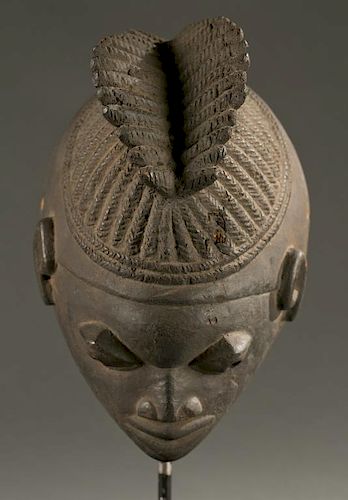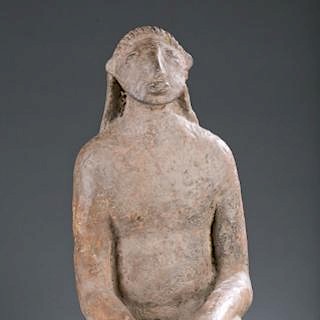Yoruba Gelede society headdress, 20th c.
Lot 210
About Seller
Quinn's Auction Galleries
360 S. Washington Street
Falls Church, VA 22046
United States
Quinn's Auction Galleries is a full service auction and estate services company. We have a range of specialties, from fine art & antiques, to rare books & maps.
Categories
Estimate:
$600 - $800
Absentee vs Live bid
Two ways to bid:
- Leave a max absentee bid and the platform will bid on your behalf up to your maximum bid during the live auction.
- Bid live during the auction and your bids will be submitted real-time to the auctioneer.
Bid Increments
| Price | Bid Increment |
|---|---|
| $0 | $10 |
| $300 | $25 |
| $500 | $50 |
| $1,000 | $100 |
| $3,000 | $250 |
| $5,000 | $500 |
| $15,000 | $1,000 |
| $20,000 | $2,000 |
| $30,000 | $2,500 |
| $100,000 | $5,000 |
About Auction
By Quinn's Auction Galleries
Oct 1, 2016 - Oct 2, 2016
Set Reminder
2016-10-01 11:00:00
2016-10-02 11:00:00
America/New_York
Bidsquare
Bidsquare : Estate of Merton Simpson & Multi Estate Ethnographic
https://www.bidsquare.com/auctions/quinns/estate-of-merton-simpson-multi-estate-ethnographic-1779
Quinn's Auction Galleries dquinn@quinnsauction.com
Quinn's Auction Galleries dquinn@quinnsauction.com
- Lot Description
A Gelede society headdress. Nigeia, Yoruba. 20th century. 6 3/4"h x 8"w x 12"d.
Provenance: Inventory and Collection from the Estate of Merton D. Simpson. Catalog Notes: "Masks like this are worn by men in elaborate masquerade performances known as "Gelede." This ritual takes place each year between March and May, at the beginning of a new agricultural season. The purpose of the performance is to pay tribute to the special power of women, both elders and ancestors, who are known affectionately as "our mothers." Women can use a spiritual life force, ase, which can be creative or destructive. When these powers are used destructively, women are called aje (witch), and, if angered, are believed to have the capacity to destroy individuals or entire communities. The masquerade provides an opportunity for "our mothers" to be placated or pampered so that they do not use their destructive powers against the Yoruba people; instead they encourage rain and fertile soil. The masks are worn at an angle on the top of the head, with pairs of men wearing similar masks. The masquerade has an elaborate and bulky costume, emphasizing the breasts and buttocks of the woman it represents, showing the desired fatness of a beautiful and graceful woman. The identity of the wearer is not secret; he can be seen through the transparent cloth worn over the face, and he can unmask in public. The name of the dancer may be given in the song which accompanies his act, making him the subject of praise or criticism, depending on the skill and rhythm of his performance. Drumming and singing, essential features of the performance, accompany the strictly choreographed dance. The harmony and balance demonstrated by good dancers shape a metaphor for social perfection, where people help one another, share their wealth and talents, and enjoy the life they have been given. The Gelede headdress often consists of two parts, a lower mask and an upper superstructure. The lower mask depicts a woman's face, its composure expressing the qualities of calmness, patience, and "coolness" desired in women. The static expression and simplicity of this portion of the headdress contrasts with vitality and diversity of the superstructure. The design of the superstructure is intended to placate the mothers by displaying their inner powers for all to see, thus pleasing them and ensuring the well-being of the community." See Rand African Art, "Yoruba Gelede headdress with 3 birds - probably pigeons". - Shipping Info
-
Shipping and Handling Policy:
Quinn's Auctions ONLY ships with FedEx Domestic and USPS internationally. We do not ship Media Mail. Shipping costs are based on the weight of your lots and your location. We require a complete shipping address and phone number to process your shipping quote. You will receive your shipping quote in your invoice via your registered email with a tracking number if available. Once payment is received Quinns will ship items FedEx ground in the United States, USPS International or release items to an outside shipper.Quinn's Auctions reserves the right to recommend an outside shipper based on fragility and size of lot. We offer recommendations for outside shipping by trusted shippers if necessary. If using an outside shipper Quinn's Auctions is not responsible for damages by carriers or packers of purchased lots, whether or not recommended by Quinn's Auctions and will not be liable for any losses which result.
-
- Buyer's Premium



 EUR
EUR CAD
CAD AUD
AUD GBP
GBP MXN
MXN HKD
HKD CNY
CNY MYR
MYR SEK
SEK SGD
SGD CHF
CHF THB
THB














